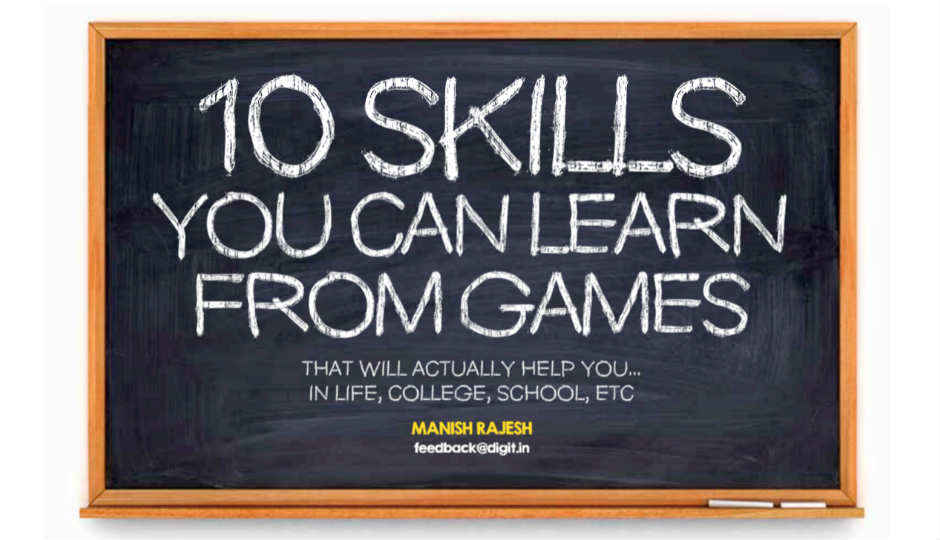10 skills you can learn from games

That will actually help you… in life, college, school, etc
The reason you’re going to immediately start reading this story is because you want to see if it’s something you can show to your parents in order to get them to buy you a gaming rig, or to upgrade your existing one. Plus, you probably think this might get them off your back when you want to play games instead of doing chores… good luck with that. If your parents are frowning on your video gaming it probably has something to do with the way your life is going.
This article is not trying to justify your gaming binges, or validate your bias towards gaming, or even tell your parents off for being so old school in their beliefs. This is a factual article that aims to take a look at some of the benefits of gaming in moderation, and we want to specify: in moderation! There’s a good reason parents try and regulate your gaming – it’s because it’s so darn addictive, and it makes it so easy for us to procrastinate. However, you have to do it in moderation, or else it can cause serious problems. We should know… if we didn’t have an internal regulator that told us when we were going too far, you’d never get to read another Digit magazine again because we’d all be passed out at our desks from exhaustion after playing games for days on end.
Enough preaching, however, because what this article will do from now on is focus on the several benefits that gaming can have for an individual, and how it can enhance your skills, or even give you all new skills that you couldn’t learn anywhere else!
Problem solving skills
Even when you’re playing games such as Angry Birds, or Cut the Rope, and especially when playing complex puzzlers like the Portal series, you’re basically training your brain to think logically in order to solve the puzzles. Not only are you indulging in problem solving and using the logic centres of your brain, you’re being forced to do it within a time limit. This translates to a very real-world skill that you will often put to use at work.
One of the things many new recruits into the workforce struggle with is lateral thinking (thinking outside the box), and thinking fast, and on the job. Games certainly seem to help in that aspect.
Following instructions
This may seem like not a big deal at first, but a lot of employers and teachers complain about people not following instructions. Very often people don’t treat an instruction as an order, and look at it as a guideline instead. This often means that you end up working in a way that doesn’t please your employer or teachers. When you play a lot of games, especially ones that have quests and missions, you pay attention and listen up carefully, because you know that success or failure is determined by how much you follow the rules of the game. Real-life is pretty similar in that sense because sometimes it doesn’t matter how silly a rule sounds, success is often gotten by following the set procedure for doing things. Yes, there is always scope for creativity, and gamers seem to abound with that, but we all know that we will follow instructions diligently if we know that success depends on it.
Hand-eye coordination
When playing fast-paced games – shooters such as Counter Strike, Battlefield, Quake or Call of Duty, or a racing game such as Forza or Need for Speed – a gamer needs to keep track of a lot of things. You need to aim and position yourself in shooters, and in racers, you need to fine tune your steering skills and in all action games, you need to have good reflexes. Of course, we’re not suggesting that gamers would make excellent sportsmen – because frankly that would be ridiculous. However, since gamers are already usually geeky and the indoors types (exceptions like you notwithstanding), it doesn’t hurt for them to hone their hand-eye coordination. Studies have shown that surgeons can hone their hand skills by gaming… So now you can tell your parents you’re practicing to become a doctor when you’re fragging people in CS: GO.
With gaming now going mainstream, more and more people are taking it up, and games are becoming more challenging as well. Plus, even simple games such as Temple Run on phones or tablets have a lot of us honing our reflexes on a daily basis.
With VR coming soon, we expect that multitasking and hand-eye-coordination are going to become even more important in games, and thus we will improve our skills not just by sitting on our backsides, but also while up on our feet and moving about. That should also help us shed a few pounds that we’ve put on from all the Red Bull and junk food we consume during our gaming binges.
Strategy, planning and multitasking
Real time strategy (RTS) games often require us to manage a ton of resources, troops and units. Games such as Age of Empires, Warcraft, and Starcraft are prime examples of this genre. Although you may think that RTS games only need for a player to become super fast at carrying out tasks and basically just have faster typing and mouse skills, nothing could be further from the truth.
Some of us here at Digit have beaten people at RTS games who were all about speed, simply by being better at planning and strategy. Put quite simply, a better brain will always beat a faster hand in an RTS. What this genre really teaches you is to think of multiple things at once, and not just type / execute commands at the speed of light, but also quickly read a situation, think ahead, and plan for pretty much all outcomes. This is a very handy skill to develop when you have high-stress jobs, or jobs that require a lot of multitasking – doctors, surgeons, paramedics, lawyers, field engineers, stock analyst, etc. Actually, pretty much all jobs today have an aspect of this requirement, and with technology becoming all pervasive, the ability to work quickly, efficiently and strategically with tech is a huge boon.
Learning technical skills
There’s many games that actually teach you a new skill. You actually learn to play guitar with games such as Rocksmith 2014, and of course you can play games such as Rock Band to get the idea of how to follow a song’s rhythm, and also get interested in playing an instrument.
You can improve your geography skills with games such as 80 Days, as you circumnavigate the world. You can use the realistic physics of space program sims such as the Kerbal Space Program, to learn a thing or two about physics. Even Minecraft helps you brush up on your electrical engineering skills – you can automate a home using redstone found within the game to power devices and control them via levers and switches. There are games that help you improve your programming and typing skills, such as SpaceChem or Code Combat (programming) and TypeRacer or TapTyping respectively. If you’ve got two left feet, you can improve your dance moves with games such as Just Dance or Dance Dance Revolution. Actually, if there’s an activity that is popular enough for more than a few humans to do, there’s probably a game dedicated to it. There’s no better or more fun way to learn something than via a game.
Get cultured
Games such as Assassin’s Creed and Age of Empires (to name a few) are set in the distant past. They are often set in historical times, and even refer to events that are historically accurate. By playing the game, without even realising it, you have picked up on some ancient history. Gamers are always the ones who will surprise people at a get together with their arcane knowledge of history or culture because they learnt it in a game. they know stuff about wars that were fought, famous generals, locations, names of important civilisations and structures, etc.
Because big budget games are usually well researched and go very indepth into their relative subject matters, they are usually accurate. Of course we’re not suggesting that you believe a game over your history book, but more often than not, the two will agree.
The surprise factor of this knowledge is often worth it’s weight in pure gold. There’s nothing like showing up a snooty rich kid who pretend to be all cultured and knowledgeable at a party – especially if it’s in front of a girl or guy you have the hots for… Or maybe we’ve just been watching too many silly flicks with bad scripts that are written specifically to make geeks like us feel good about ourselves.
Teamwork and cooperation
Games like World of Warcraft and other MMORPGs require communication between a large number of people for successful raids. And games like DotA, LoL and Counter Strike need good communication between teams of five members in order to function as a team. It’s not uncommon for gamers to make good friends over the internet these days. And thanks to the highly sociable environment that online games create, people who play online games are often found to be sociable in real life as well.
However, the most important aspect of multiplayer gaming is that it teaches us gamers patience, and the need to cooperate and work towards a common goal. Thanks to the increasing penetration of broadband internet in India, more and more people are starting to play multiplayer games, and as a result, more and more people are learning the valueable lesson of teamwork. As we’ve learnt from our online gaming sessions ourself, a good team average players with great understanding and willingness to cooperate often beats a team of skilled individuals who all go at it alone. So what are you waiting for? If you’re a multiplayer gamer, you better start updating your CV right away and adding in all the jargon we’ve thrown at you. Who knew playing WoW and DOTA would allow you to add skills to your biodata, right?
Stress management / learning to lose
If there’s one thing gamers are really good at, it’s keeping their cool. PC gamers especially are like Xen masters. No one knows how frustrating it can be to try and then fail, and then try again, and fail even more miserably, but never giving up, no matter how useless the goal seems, until at last you succeed. You just cannot be a gamer if you can’t handle frustration and defeat. We gamers learn from our mistakes like no other, and we do it (mostly) without losing our cool. Add to that the fact that PC gamers have to put up with Windows bugs, dying hard drives, constant upgrade cycles and buggy drivers… As if the games weren’t hard enough on their own, we have to deal with a bucketload of other problems. It’s all worth it in the end though, because we always excel, we always over come, we always win. PC Master Race ftw!
Oh we almost forgot. We’re supposed to mention a game name: try Keep Talking and Nobody Explodes if you want to try a really stressful game.
Risk taking
Going with the previous point, you can’t learn to take calculated risks unless you have both lost and won in life. That’s pretty much the standard description of a gamer. Taking risks is part of games, and with the serious nature of a lot of games these days, there’s often actual money or a large time investment involved. If you fail, you stand to lose upgrades, or stuff you’ve bought, or worked hard for… there’s “real” loss involved these days, not cute “deaths” like in the Super Mario days. All of this makes gamers more prepared for real life problems, especially in work environments.
Entrepreneurial ability
Tycoon games have been around for some time now. Our first taste of It was Zoo Tycoon, and boy was that fun. At first it was just fun to put people in cages with gorillas (to soon?), and watch as they were terrorised, eventually we started playing the game to win. Then things got really serious – from ticket pricing to choosing the cost of snacks, managing the cost of the hired help and having to account for maintenance costs, pretty soon we were thinking long and hard about every financial decision.
However, it’s not just business sense from tycoon games, there’s also online RPGs for instance, which have little economies of their own, and you have to learn to master the rules of the game to succeed and gather resources. You learn about supply and demand, and how important it is to have what is in demand, etc. All of this adds up to gamers being really savvy money managers, and perhaps prepares them for the stock markets. Of course, all of the smarts we earn from games can’t prevent us from splurging on something extravagant top enhance our gaming experience! We’re only human after all!
This article was first published in the July 2016 issue of Digit magazine. To read the Digit magazine regularly, subscribe to the print issue, or click here to access the e-mag
Manish Rajesh
Manish can usually be found fervently playing video games of all kinds or… no wait he’s pretty much always playing games View Full Profile









